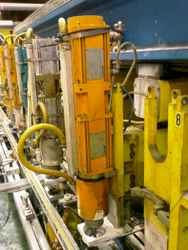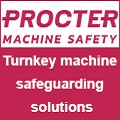
Posted to News on 2nd May 2018, 09:47
Keep your old servos
Servo motors are reliable workhorses that will typically operate virtually maintenance free on most applications for 10 to 15 years before they will eventually need to be replaced. In fact, it isn't uncommon at all for quality servos to last longer, and some operators are still running motors that are over 15 years old with no performance or maintenance issues at all.

But there are potential problems lurking for operators of older equipment that are quite happy with the way things are. The servo and control equipment in use might be old, but if it's performing perfectly there's probably no need to change it, and if any of the motors do eventually start to fail the most logical and cost-effective option would be to replace them with like-for-like drop-in replacements.
The problem arises when maintenance engineers discover that their original supplier no longer stocks or supports the old motors. Most manufacturers will usually recommend upgrading to their very latest product, but this could involve re-engineering to accommodate the new motors on old machines, as well as new cabling, software and new drives. If the operator has a factory with many similar machines then retrofitting them all with new equipment when all that was really needed was a replacement servo is not logical by any measure.
For companies operating a large number of machines, all fitted with the same motors and control equipment, which is perhaps all of a similar age, it's worth having a plan in place for when any of the components fail. The good news is that there's a very good chance that an upgrade can probably be avoided if maintaining the original technology is deemed to be the preferable option.
It's worth remembering that the automation industry, just like most other industry sectors, commonly shares components between manufacturers. One manufacturer might badge servo motors from another as its own, and exactly the same product is likely to be obtainable from different suppliers. So, when one company says it no longer supports a particular type of motor, it's not necessarily the end of the story. Someone else might.
Popular and reliable motors
For instance, a very popular and reliable range of servo motors, manufactured by a company few engineers are likely to have heard of, has been sold over the years by a variety of different suppliers, badged as their own product.
The ACM2n range of motors are reliable, cost effective and high performance, but for presumably strategic and marketing reasons some suppliers have recently delisted it from their product portfolio. This may be because they have replaced it with a motor range that they're manufacturing themselves or for product streamlining reasons, but for whatever reason it isn't listed as available.
Maintenance engineers wanting to replace an old ACM2n motor can do so easily though. Many specialist servo equipment suppliers, like Motor Technology, can still supply the ACM2n range, with exactly the same motor type coding and documentation, even though engineers may have found that their original supplier no longer supports it.
In fact, the history of the manufacture and supply of servo equipment is a complex one that only specialist independent servo equipment suppliers are likely to be aware of. Not only are there manufacturers making product for other manufacturers but there are buyouts, mergers and acquisitions to contend with too. Motor Technology maintains a database of products and companies that effectively tracks what happens to a company's products when it merges with, or is taken over by, a rival.
There are even companies that manufacture discontinued products under licence to the same high standard as the originals. So-called legacy products can often be a good option when old servo equipment needs replacing and is not supported by the original manufacturer.
A good independent servo specialist, like Motor Technology, will have the capability to guide maintenance engineers to the quickest solution in order to get their applications up and running again as quickly as possible.
What's more, an independent is unlikely to be biased toward any one product over another, and will be able to recommend the best options. For companies operating older servo equipment, an independent will almost certainly look first at supporting the customer's existing technology and will have the capabilities and knowledge to do that. More often than not, there really is no need to upgrade, and a lot of old systems can be supported effectively for many years to come.
To learn more please visit www.controlinmotion.com.
Want the latest machine building news straight to your inbox? Become a MachineBuilding member for free today >>















